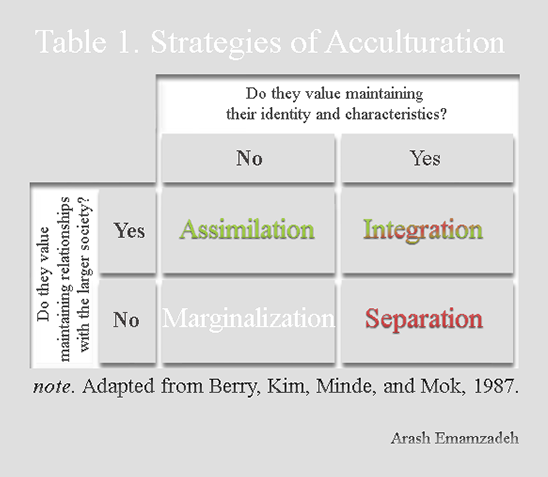use the psychological theory of Acculturation and explain how this
Acculturation is a psychological theory that describes the process of cultural change and psychological adjustment that occurs when individuals from one culture come into contact with another. This process often results from colonization, immigration, or cultural exchange, where individuals or groups may adopt aspects of the dominant culture while retaining elements of their original culture. Understanding acculturation helps illuminate the complex dynamics of cultural fusion and colonization.
One of the key frameworks for understanding acculturation is Berry's Model, which outlines four main acculturation strategies: assimilation, separation, integration, and marginalization. Assimilation involves adopting the dominant culture to the extent of losing one’s original cultural identity. In contrast, separation entails maintaining the original culture while rejecting the dominant one. Integration, viewed as a more favorable outcome, promotes a blending of both cultures, whereas marginalization occurs when individuals feel alienated from both their original and the dominant culture.
Historically, the impact of colonization can be observed starkly through the lens of acculturation. The European colonization of Indigenous peoples in the Americas is a prime example. Colonizers imposed their languages, religions, and customs upon native populations, often leading to significant cultural assimilation. Many Indigenous groups were forced to abandon their traditions, resulting in a profound loss of cultural identity. However, some communities managed to integrate, adapting certain aspects of European culture while simultaneously preserving significant elements of their own heritage.
In a contemporary context, the Los Angeles community serves as an excellent microcosm for examining acculturation and cultural fusion. The city is home to diverse immigrant populations, particularly from Latin America and Asia. A clear example can be seen in the vibrant culinary scene of Los Angeles, where traditional dishes are often fused with local ingredients and cooking styles. Tacos filled with Korean BBQ, a dish that emerged from the blending of Mexican and Korean cultures, showcase the integration aspect of acculturation. This culinary fusion not only reflects the creativity of the local community but also represents deeper social interactions and coexistence of multiple cultural identities.
Media also plays a crucial role in depicting acculturation. For instance, television shows like "Jane the Virgin" illustrate the challenges and triumphs of navigating multiple cultural identities in a modern American context. The lead character, Jane, embodies the integration of her Latinx heritage with her American upbringing, highlighting the complexities and nuances of being part of two cultures.
In summary, the psychological theory of acculturation provides a useful framework for understanding the interplay of colonization and cultural fusion. By examining case studies from history, specific communities, and media representations, we can appreciate how individuals and groups navigate the challenges of cultural change, often resulting in a rich tapestry of hybrid identities. For further details on acculturation, you can visit Wikipedia's page on Acculturation or delve into Berry's Model through the Culture and Psychology resource.
Sources
:max_bytes(150000):strip_icc()/acculturation-definition-3026039_FINAL-f35046104ed84135897f87171b922557.png)

Related Questions
Work fast from anywhere
Stay up to date and move work forward with BrutusAI on macOS/iOS/web & android. Download the app today.
